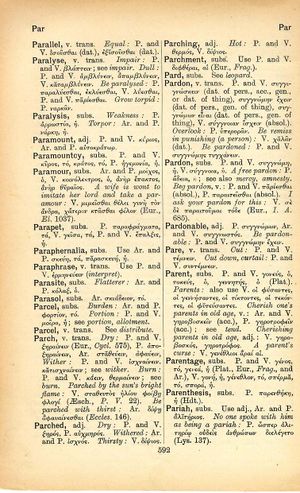paralysis
αἵ τε γὰρ συμφοραὶ ποιοῦσι μακρολόγους → For, in addition, our misfortunes make us long-winded (Appian, Libyca 389.3)
English > Greek (Woodhouse)
substantive
Latin > English (Lewis & Short)
părălysis: is, f., = παράλυσις,
I palsy, paralysis: paralysi mederi, Plin. 20, 3, 8, § 14: paralysi periclitari, id. 20, 15, 59, § 165: adulescens, paralysin cave, Petr. 120; Vulg. 1 Macc. 9, 55.
Latin > French (Gaffiot 2016)
părălўsis, is, f. (παράλυσις),
1 paralysie d’un côté du corps : Plin. 20, 14 ; 20, 165
2 [chez les haruspices] explication : Fulg. Myth. 3, 10.
Latin > German (Georges)
paralysis, is u. eos, Akk. in, Abl. i, f. (παράλυσις), I) als mediz. t. t., die Lähmung der Nerven an einer Seite des Körpers, die Paralyse, der Schlagfluß, rein lat. nervorum resolutio od. remissio, Plin. u.a. – II) als t. t. der Haruspizin, die Auflösung, Erklärung, Fulg. myth. 3, 10.
Latin > English
paralysis paralysis N F :: paralysis; any of several forms of paralysis; apoplexy; palsy (L+S)
paralysis paralysis paralysos/is N F :: paralysis; any of several forms of paralysis; apoplexy; palsy (L+S)

